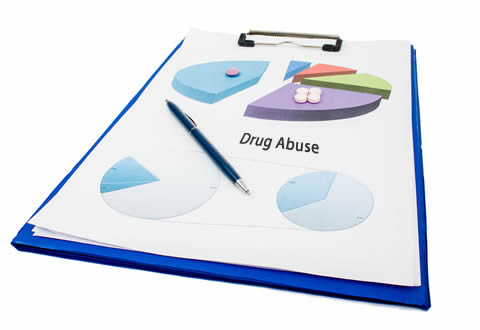Drug Abuse Statistics
 Drug abuse statistics show that the level of drug and alcohol addiction in our country has reached epidemic proportions. Most Americans have used at least one illicit drug in their lifetime, but a staggering 22.5 million people in the U.S. alone are either currently drug dependent or have abused drugs within the past year. There doesn't seem to be any line drawn in terms of who this affects and where, and the drug problem is apparent in all regions of the nation and permeates all age groups and ethnicities. In order to fix the drug problem it is important to become educated about drug abuse statistics, to see who this affects and how so that proper measures can be taken to effectively address this issue.
Drug abuse statistics show that the level of drug and alcohol addiction in our country has reached epidemic proportions. Most Americans have used at least one illicit drug in their lifetime, but a staggering 22.5 million people in the U.S. alone are either currently drug dependent or have abused drugs within the past year. There doesn't seem to be any line drawn in terms of who this affects and where, and the drug problem is apparent in all regions of the nation and permeates all age groups and ethnicities. In order to fix the drug problem it is important to become educated about drug abuse statistics, to see who this affects and how so that proper measures can be taken to effectively address this issue.
Alcohol Abuse Statistics
Alcoholism and alcohol abuse are the most common drug abuse problems in this country. While alcohol may be legal, this doesn't make it any less of a problem and certainly doesn't make the consequences of its abuse any less significant. Drug abuse statistics show that over half of Americans report past month use of alcohol. This too not only affects "of-age" individuals, but youth as well, with 11% of all alcohol annually being consumed by underage drinkers. Most of this alcohol is consumed by underage "binge" drinkers. This binge drinking leads to many unwanted pregnancies and other consequences such as violence and automobile accidents. Drug abuse statistics shows that alcohol causes over 17,000 fatalities annually as a result of drunk driving, and 31 million Americans admit to having driven drunk in the past year as of 2008. The problem of alcoholism affects older Americans as well, and is the most abused drug by adults aged 50 and older. So as you can see, anyone of any age can fall prey to alcohol abuse and alcoholism and drug abuse statistics show that the problem will only get worse unless effective action is taken to educate the masses and provide effective treatment options for those that need it.
Marijuana Abuse Statistics
Drug abuse statistics regarding marijuana shed light on just how much this drug is used and abused. Use and abuse of marijuana is extremely common, and it is statistically the most used and abused of any illicit drug. An estimated 17 million Americans admit to having used marijuana within the past month, and there are millions of new users each year. This is partly because of the fact that marijuana use isn't as stigmatized as some of the more hardcore illicit drugs. However, many users underestimate the effects, side effects and risks associated with marijuana use. The drug can cause dependence and addiction and many long-term users find it extremely difficult to stop using marijuana and often suffer withdrawal symptoms if they do stop. Marijuana is also a gateway drug to more hardcore drug use, and according to drug abuse statistics is the most commonly abused illicit drug and the drug of choice among 8th, 10th, and 12th graders in the nation. An estimated 2.4 million youth used marijuana for the first time in 2009, which is an average of about 6,500 youth every single day potentially being set up for a life of addiction.
Prescription Drug Abuse Statistics
Do you know someone suffering with an addiction problem?

Speak with an addiction counselor now to learn how you can help someone who is having problems with substance abuse find the road to recovery.
Simply call toll-free 1-888-794-0381 or email us! Our counselors are available 24/7.100% confidential! Call now.
The diversion and illicit use and abuse of prescription drugs are highlighted by drug abuse statistics which show an ever-growing problem. Non-prescription use of opiate pain killers, stimulants, sedatives, tranquilizers and benzodiazepines is sometimes considered an acceptable occurrence due to the fact that these drugs are not illegal and sometimes even prescribed by a medical professional. However, abuse of prescription drugs is just as dangerous and carries the same risks as use and abuse of illicit street drugs and are just as addictive. There are an estimated 6 million people who are currently using prescription drugs non-medically, meaning they either have no prescription for the drug they are using or are misusing a drug for which they have a prescription. Using prescription drugs in this manner is the second most common form of illicit drug use following marijuana. As a result, individuals become dependent to prescription drugs which then leads to drug seeking behavior and the dangers that this presents. Many individuals who are addicted to prescription drugs acquire them through illicit means and use them irresponsibly resulting in many deaths each year as a result of prescription drugs abuse.
Many accidental deaths where prescription drugs are involved occur as a result of the abuser mixing prescription drugs with alcohol or other drugs in an attempt to achieve more potent effects or to get high. This leads to many overdoses and permanent health consequences as a result. For example, in 2005 there were 22,400 drug overdose deaths and opioid prescription drugs were responsible for over 38% of them. Drug abuse statistics show that the prescription drug problem is also not just a problem among older Americans, and 1 in 10 high school seniors admitting past year use of the opiate the painkiller Vicodin, and 1 in 20 abusing OxyContin. It's tough to absorb one's education when on such powerful narcotic drugs, especially if one is using these non-medically and not as prescribed.
Illicit Drug Abuse Statistics
Drug abuse statistics show that rates of use of other illicit drugs of abuse are just as startling. Consider the fact that there are around 2 million individuals in the U.S. who are currently using cocaine, around 1 million hardcore heroin addicts, 1.4 million individual who report past year use of methamphetamine, and an estimated 1 million past year users of Ecstasy. With these types of drug abuse statistics, one can only imagine the devastation that this causes on a daily basis for those involved. Think of this in terms of violence, domestic abuse, crime, and social, economic and health consequences. With millions of Americans struggling with addiction to alcohol, prescription drugs and illicit drugs the need for effective drug treatment has never been greater. Many individuals don't get the help they need, yet effective drug rehab programs have helped millions of individuals overcome any kind of addiction and some are even tailored to meet the specifics needs of individuals seeking treatment.
Need help finding treatment?
Choosing the correct treatment program for yourself or a family member can be one of the the most important decisions you ever make. With so many choices for treatment, and so many variables to consider, getting help from a knowledgeable addiction specialist who understands what types of treatment will work best is invaluable.
Our addiction specialists are available 24 hours a day to answer any questions you may have about treatment. All calls and services are completely free of charge and completely confidential. Start your recovery today!
-
11,762
Rehab Centers
-
4,146
Locations
-
82,334
Services Offered
-
Infinite
Lives Saved

